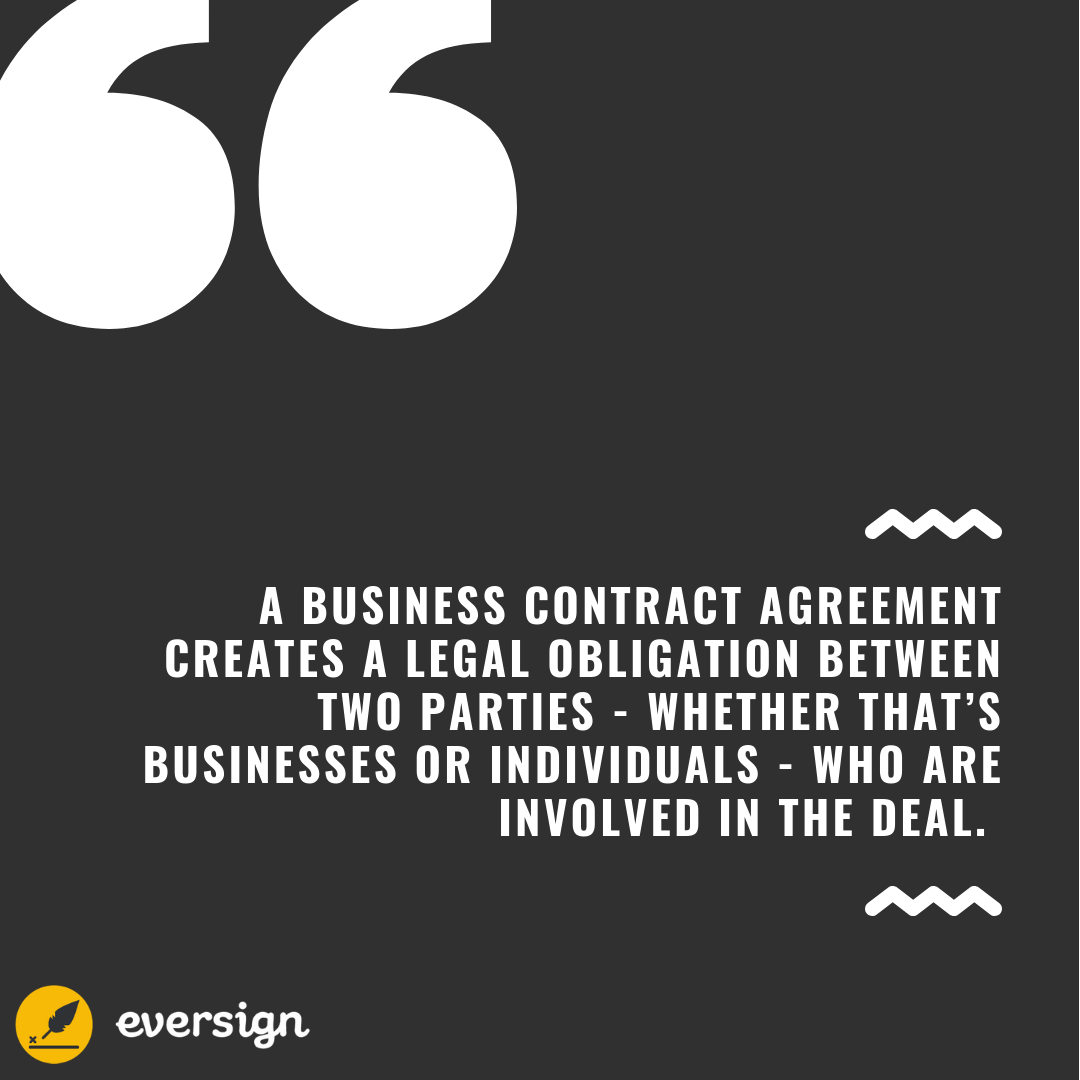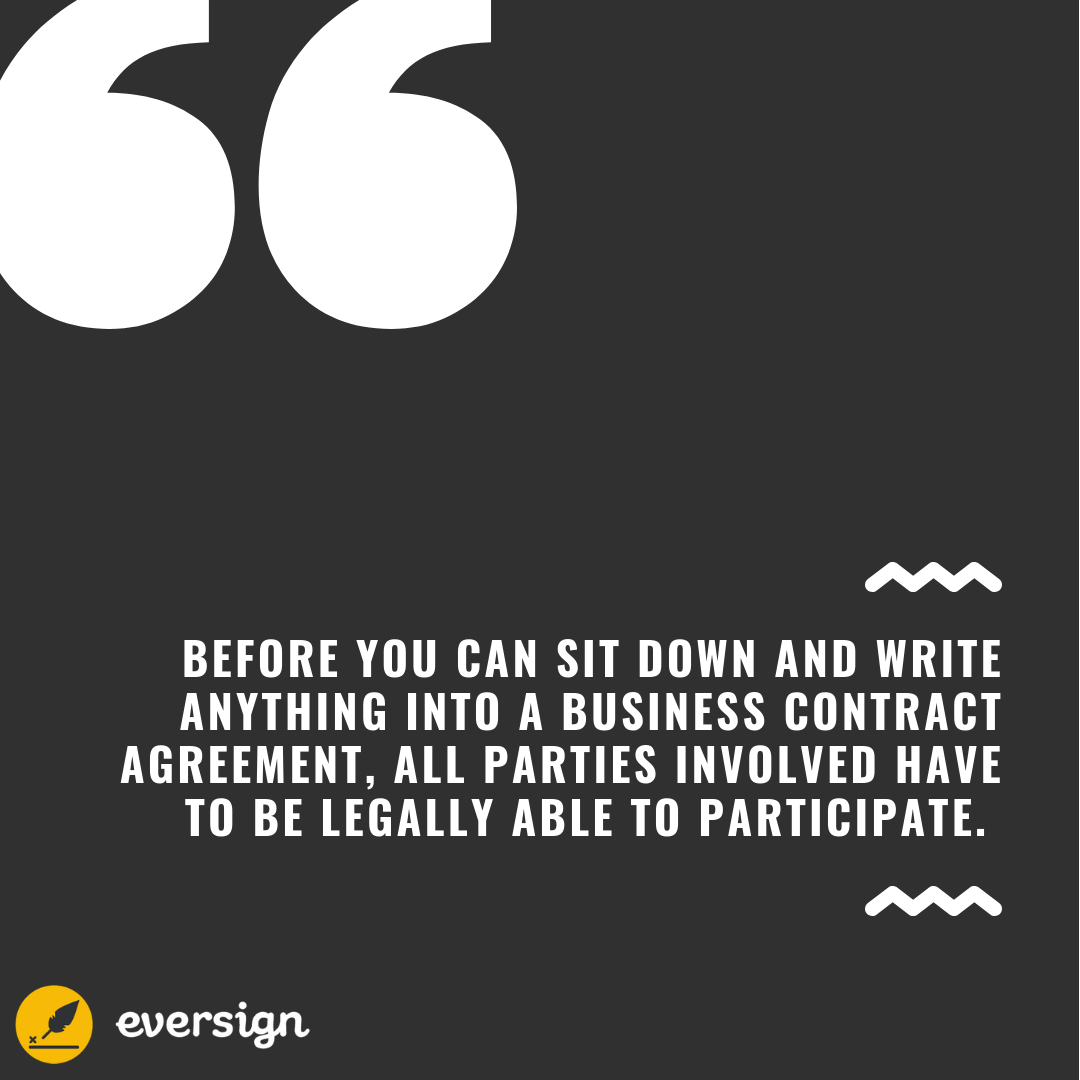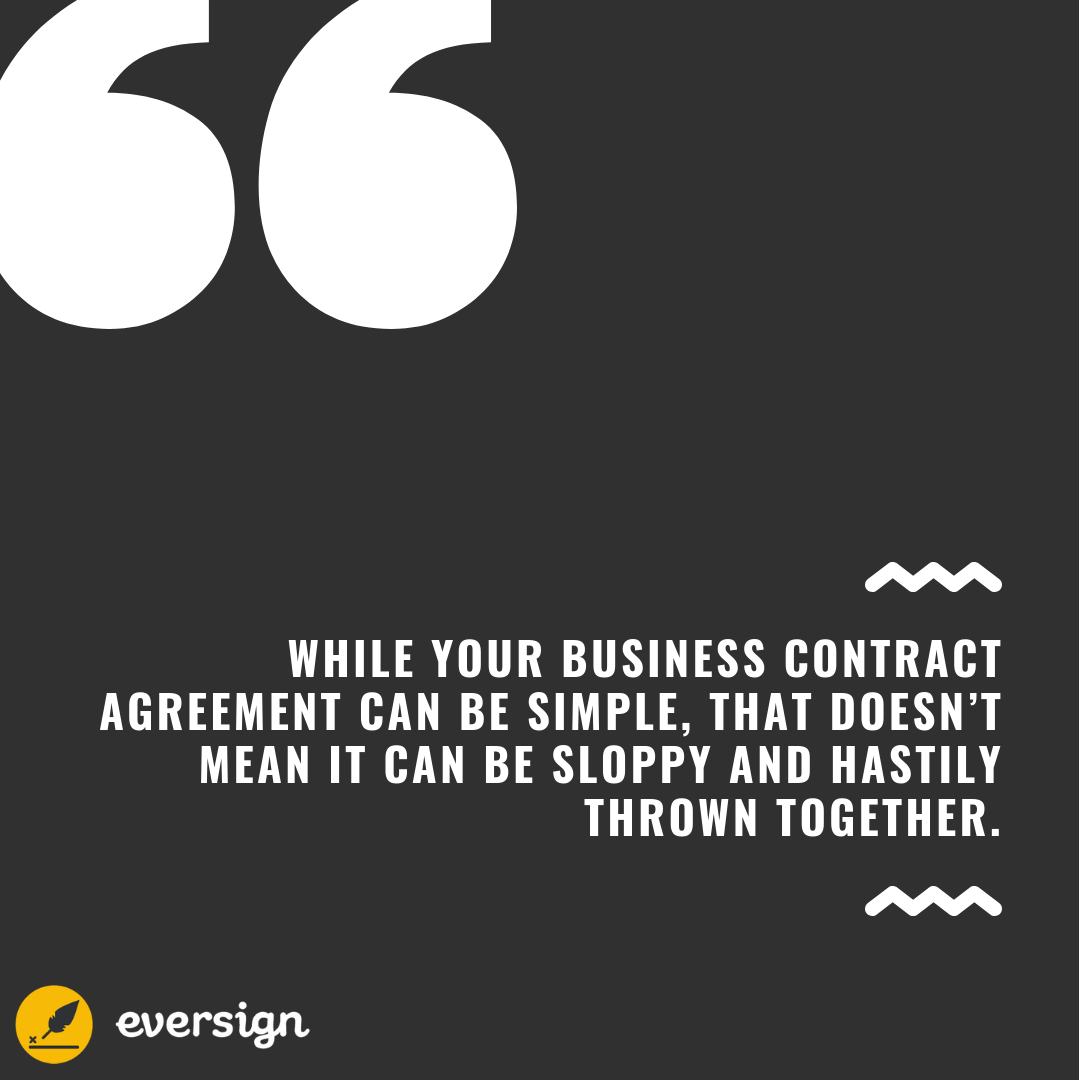Contracts are essential in life today and for the most part, a contract is only worth the paper it’s written on.
There was once a time that a verbal agreement and a handshake would be enough for a business interaction, but times are changing and this means that businesses need to make sure that they get everything agreed fairly in writing every single time a contract is made.
That’s where a business contract agreement comes in. But what exactly is a business contract, and what should it include? And most importantly, how do you create one that’s fair for all parties involved?
In this guide, you’ll learn:
- What a business contract agreement is
- Why they’re so crucial
- How to make a business contract agreement that’s everyone’s happy with
What is a Business Contract Agreement?
A business contract agreement creates a legal obligation between two parties - whether that’s businesses or individuals - who are involved in the deal.
A contract signed between two or more people is an agreement in writing for goods or services exchangeable, and this piece of paper is enforceable in a court should anything go wrong.
It’s a good way to get down the intentions of both sides, agreed and signed - like a paper handshake that can’t be forgotten about.

Why Business Contract Agreements Are Necessary
Every single business owner needs to know what a business contract agreement entails, as they’re all a part of running their business.
Very often, businesses will choose lawyers to work with them to help them draft a contract, but there are times when businesses can choose to use other methods (like Xodo Sign) to create and sign contracts that are just as legally binding.
Unfortunately, it’s common to run into situations where a business contract agreement isn’t exactly fair to both parties, particularly if one side isn’t as experienced or knowledgeable about contracts.
While part of this will come with experience, there are certain things you should know and look out for before creating or signing one of these docs.
For instance, contracts themselves have three very essential pieces:
- An offer
- An acceptance of the offer
- A breakdown of what each person will get out of the contract itself.
Terms should never be rushed when it comes to writing a contract and it should be written in a way that both sides of the agreement can understand what it all means without the influence of a legal body to interpret the jargon.
This allows everyone to be clear about what is required of them and protects each party so that they can be helped if the contract has been breached.
Can’t I Just Make a Verbal Business Agreement?
Sometimes, a verbal agreement is okay when the situation is simple, but it’s not enforceable in a court of law.
This is why it’s so important to have an agreement in writing. Both parties will know where they stand and can move forward together.
Oral agreements have previously been legal and binding, but they can’t be enforced easily in court and that’s where the issue usually lies.
One of the reasons business owners (particularly small business owners and freelancers) steer away from business contract agreements is because they don’t want to pay to have a lawyer create the document.
The good news is you don’t always have to go through a lawyer. For smaller deals or casual business agreements, it’s becoming more and more common to use business contract agreement templates online through tools like Xodo Sign to streamline the entire process.
But even if you go that route, it’s important to understand the elements of a contract. So next, we’ll give you some good tips to create a fair business contract agreement:
1. Legal Participation
Before you can sit down and write anything into a business contract agreement, all parties involved have to be legally able to participate.
Not only that, but you’re going to waste your time trying to sign a contract with someone who isn’t participating in the agreement in the first place.
A person who has no idea about the contract being formed has no business signing on behalf of someone else; if you can’t get the right person, then change the time of the contract signing and get the right people around the table.
- A business contract can only be formed with someone who has the authority to see the contract through. Also, every person who is involved in the contract signing has to be of legal age to agree to a contract.
- A contract is not valid at all if a minor is signing the agreement - unless of course the minor has guardian consent.
- If one of the parties signing the agreement is intoxicated or signing under duress, it also voids the contract in a court.
It’s better for everyone to ensure that the contract is signed by those of legal age, of sound (sober) mind and who is able to have the authority to carry out the contract.

2. Keep It Simple
A big misconception about business contracts is that they need to be super complex and packed with legal jargon.
However, the best thing about a legal contract between two parties is that you can keep it as simple as you like.
- The terms need to cover everything that matters in your agreement, and you need to ensure that each paragraph has a number so that during the discussion, you can refer to them properly.
- All parties who are involved in the contract must be in agreement of the terms, and before a contract can be legal, the offer of goods or services to be exchanged has to be made and then accepted.
- Language doesn’t need to have a bunch of ‘heretofores’ or ‘forthwith’ in there to look like it’s a legal contract.
- You can keep this simple by discussing terms beforehand because if there is a term that isn’t okay with another party, it needs to be revised until everyone agrees.
Simplicity is so important in legal contracts and not just because you could end up tongue-tied. The details of your contract need to be clear and easy to read.
3. The Devil is in the Details
While your business contract agreement can be simple, that doesn’t mean it can be sloppy and hastily thrown together.
Sometimes, the tiniest incorrect detail can void a contract. You’d be shocked if you knew how many times a contract has been canceled due to a spelling error in the name of one of the parties.
- For example, not using the legal models with the correct suffixes can mean that the contract isn’t worth anything in a court.
- If these things aren’t checked twice, you end up with no legal recourse if things do go wrong down the line.
- While you’re ensuring that the details are written properly, make sure everything is written down in clear, readable language.
- This includes short, simple sentences and plain English rather than legalese.
- A contract that goes to court is judged by how an ordinary person could interpret it, so it’s better to be safe than sorry.
- The agreement itself has to detail everything between the rights and the obligations of the people involved as clearly as possible.
- Anything discussed verbally MUST be written down so that everyone is clear about their responsibilities.
Finally, don’t leave anything out! You need to include all terms so that all parties are happy before signing.

4. What If Things Go Wrong?
Writing a contract doesn’t mean that things won’t go wrong. You can get everything out in writing and lay it all on the table but contracts can still be terminated later on.
- Contracts often last a certain period of time, and if the exchange of goods or services you are agreeing on is a one-time thing, you can specify in the contract that it would be terminated once your interaction with each other is complete.
- Reasons for a termination should be detailed very clearly, as should any penalties and dispute term resolutions.
- If one party doesn’t adhere to the agreement, the other should be allowed to terminate the contract without penalties. This is something that should be written in because if it isn’t, it’s not enforceable later.
- Disputes should be resolved simply, which is why they should be written into the body of the contract so that both parties know what is going to happen if a dispute arises.
A business contract agreement has to also include the result of minor breaches of the contract, too.
5. Make It Lawful
If both parties come from two separate areas, your contract can only comply with the laws of just one of those areas. So, you need to choose where you sign and which state laws will make sense for the contract so that it remains legally enforceable.
- If the goods or services are illegal, you cannot make a contract for them. So if the contract isn’t fulfilled, you will have it thrown out of a court.
- Voided contracts are not enforceable in a court of law, which can leave you completely vulnerable.
- You cannot contract illegal services, either. Gambling contracts have no weight when they are signed in a state where gambling is illegal, so keeping your contract legal in the state where you sign it is vital
6. Stay Confidential
Some contracts should be written with a non-disclosure agreement or confidentiality clause, especially if one party wants the information to remain as confidential as possible.
If either party is uncomfortable with a confidentiality clause being built in, the non-disclosure agreement can be signed before the contract is talked over.
You Don’t Need to be a Lawyer to Create a Business Contract Agreement
There are plenty of tools out there that can help you to write a contract if you need it.
At the same time, there’s nothing wrong with asking a legal entity to look over the information for you. A business attorney is very useful here!
Anything in your contract that you’re not sure about should be discussed before signing and you can ask for an impartial person to witness the signing, too. A business contract agreement should be as fair as possible before you sign, every time.
